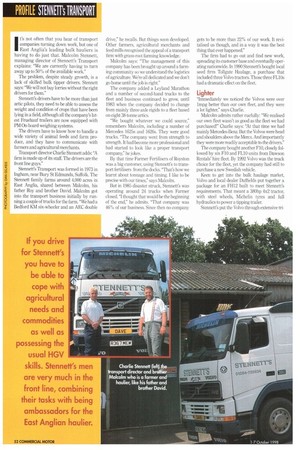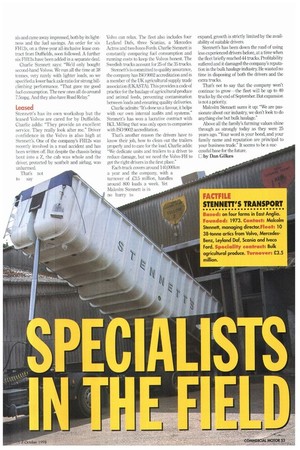If you drive for Stennett's you have to be able
Page 54

Page 55

If you've noticed an error in this article please click here to report it so we can fix it.
to cope with agricultural needs and commodities as well as possessing the usual HGV skills. Stennett's men are very much in the front line, combining their tasks with being ambassadors for the East Anglian haulier.
It's not often that you hear of transport companies turning down work, but one of East Anglia's leading bulk hauliers is having to do just that. Malcolm Stennett, managing director of Stennett's Transport explains: "We are currently having to turn away up to 50% of the available work."
The problem, despite steady growth, is a lack of skilled bulk tipper drivers. Stennett says: "We will not buy lorries without the right drivers for them."
Stennett's drivers have to be more than just artic pilots, they need to be able to assess the weight and condition of crops that have been lying in a field, although all the company's latest Fruehauf trailers are now equipped with PM On-board weighing systems.
The drivers have to know how to handle a wide variety of animal feeds and farm produce, and they have to communicate with farmers and agricultural merchants.
Transport director Charlie Stennett adds: "A firm is made up of its staff. The drivers are the front line guys."
Stennett's Transport was formed in 1973 in Ingham, near Bury St Edmunds, Suffolk. The Stennett family farms around 4,000 acres in East Anglia, shared between Malcolm, his father Roy and brother David. Malcolm got into the transport business initially by running a couple of trucks for the farm "We had a Bedford KM six-wheeler and an AEC double drive," he recalls. But things soon developed. Other farmers, agricultural merchants and feed mills recognised the appeal of a transport firm with grass-root farming knowledge.
Malcolm says: "The management of this company has been brought up around a farming community so we understand the logistics of agriculture. We're all dedicated and we don't go home until the job is right."
The company added a Leyland Marathon and a number of second-hand trucks to the fleet and business continued to grow, until 1983 when the company decided to change from mainly three-axle rigids to a fleet based on eight 38-tonne artim "We bought whatever we could source," remembers Malcolm, including a number of Mercedes 1625s and 1626s. They were good trucks. "The company went from strength to strength. It had become more professional and had started to look like a proper transport company," he jokes.
By that time Farmer Fertilisers of Royston was a big customer, using Stennett's to transport fertilisers from the docks. "That's how we learnt about tonnage and timing. I like to be precise with our times," says Malcolm.
But in 1985 disaster struck, Stennett's was operating around 24 trucks when Farmer closed. "I thought that would be the beginning of the end," he admits. "That company was 460/0 of our business. Since then no company
gets to be more than 22% of our work. It revitalised us though, and in a way it was the best thing that ever happened."
The firm had to go out and find new work, spreading its customer base and eventually operating nationwide. In 1990 Stennett's bought local seed firm Tollgate Haulage, a purchase that included three Volvo tractors. Those three FL1Os had a dramatic effect on the fleet.
Lighter
"Immediately we noticed the Volvos were over lmpg better than our own fleet, and they were a lot lighter," says Charlie.
Malcolm admits rather ruefully: "We realised our own fleet wasn't as good as the fleet we had purchased!" Charlie says: "At that time we had mainly Mercedes-Benz. But the Volvos were head and shoulders above the Mercs. And importantly they were more readily acceptable to the drivers."
The company bought another F10, closely followed by six F10 and FL10 units from Dawson Rentals' hire fleet. By 1992 Volvo was the truck choice for the fleet, yet the company had still to purchase a new Swedish vehicle.
Keen to get into the bulk haulage market, Volvo and local dealer Dirffields put together a package for an FH12 built to meet Stennett's requirements. That meant a 380hp 4x2 tractor, with steel wheels, Michelin tyres and full hydraulics to power a tipping trailer.
Stennett's put the Volvo through extensive ti-i.
als and came away impressed, both by its lightness and the fuel savings. An order for six FH12s, on a three-year all-inclusive lease contract from DuffleIds, soon followed. A further six 11-112s have been added in a separate deal.
Charlie Stennett says: "We'd only bought second-hand Volvos, We run all the time at 38 tonnes, very rarely with lighter loads, so we specified a lower back axle ratio for strong hillclimbing performance. "That gave me good fuel consumption. The new ones all do around 7.5mpg And they also have Road Relay."
Leased
Stennett's has its own workshop but the leased Volvos are cared for by Duffields. Charlie adds: "They provide an excellent service. They really look after me." Driver confidence in the Volvo is also high at Stennett's. One of the company's FH12s was recently involved in a road accident and has been written off. But despite the chassis being bent into a Z, the cab was whole and the driver, protected by seatbelt and airbag, was unharmed.
That's not to say Volvo can relax. The fleet also includes four Leyland Dafs, three Scanias, a Mercedes Actros and two Iveco Fords. Charlie Stennett is constantly comparing fuel consumption and running costs to keep the Volvos honest. The Swedish trucks account for 25 of the 35 trucks.
Stennett's is committed to quality assurance, the company has ISO 9002 accreditation and is a member of the UK agricultural supply trade association (UKASTA). This provides a code of practice for the haulage of agricultural produce and animal feeds, preventing contamination between loads and ensuring quality deliveries.
Charlie admits: "It's done us a favour, it helps with our own internal audits and systems," Stennett's has won a lucrative contract with ICI, Milling that was only open to companies with ISO 9002 accreditation.
That's another reason the drivers have to know their job, how to clean out the trailers properly and to care for the load. Charlie adds: "We dedicate units and trailers to a driver to reduce damage, but we need the Volvo FH to get the right drivers in the first place."
Each truck covers around 140,000km a year and the company, with a turnover of L3.5 million, handles around 800 loads a week. Yet Malcolm Stennett is in no hurry to expand, growth is strictly limited by the availability of suitable drivers.
Stennett's has been down the road of using less experienced drivers before, at a time when the fleet briefly reached 44 trucks. Profitability suffered and it damaged the company's reputation in the bulk haulage industry He wasted no time in disposing of both the drivers and the extra trucks.
That's not to say that the company won't continue to grow—the fleet will be up to 40 trucks by the end of September. But expansion is not a priority.
Malcolm Stennett sums it up: "We are passionate about our industry we don't look to do anything else but bulk haulage."
Above all the family's farming values shine through as strongly today as they were 25 years ago. "Your word is your bond, and your family name and reputation are principal to your business trade." It seems to be a successful base for the future. LI by Dan Gilkes
FACTFILE STENNE17'S TRANSPORT
Based: on four farms in East Anglia.
1973. Malcolm Stennett, managing director. 10
38-tonne artics from Volvo, MercedesBenz, Leyland Daf, Scenic' and lveco Ford. Speciality contract: Bulk agricultural produce. Turnover: £3.5 million.
















































































































